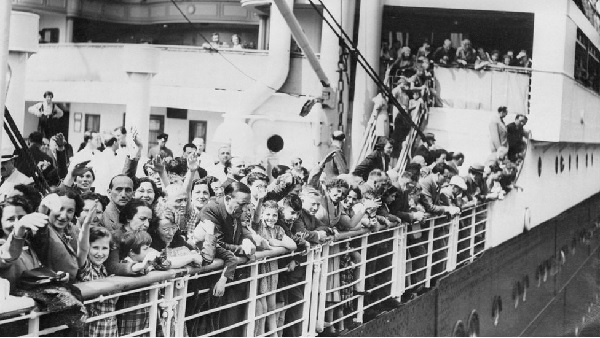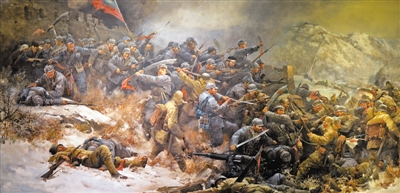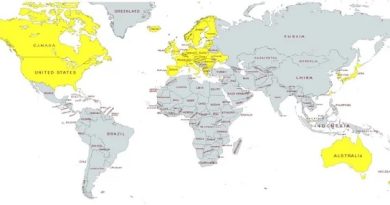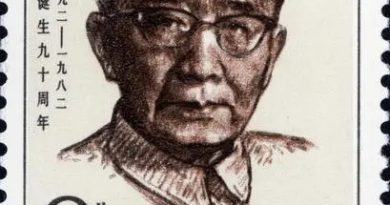Anti-Japnese-Invasion War vs Second Sino-Japanese War

Fig:China was a piece of meat on the chopping board of the world powers. The Three Northeast Provinces were Russian sphere of interest.
For the Chinese people, there was only one Anti-Japanese-Invasion War. It lasted for 14 years, starting in 1931, ending in 1945. For such a long war, western historians use many terms including the Second Sino-Japanese War, the Second World War(WWII) and/or the Pacific War to refer to a part of the war from different angles. All three terms add together cannot cover the whole 14 years of the Resistance against Japan. From a geopolitical perspective, the Anti-Japanese-Invasion War can be divided into three sections:
1) The war of Japan confronting Soviet Russia from 1931 to 1937, in which the Western Powers were allies of Japan encircling Soviet Russia.
2) The war of Japan to colonize China, in which the westerns were neutral and did not take either side of the war, making the war termed the Second Sino-Japanese War. This term is neutral and does not tell which side is right or wrong. In comparison, the term Anti-Japanese-Invasion War puts the Japanese imperialist invasion and occupation at the wrong side and the Chinese citizens as the victims and at the justice side of the war.
3) The wars among imperialist powers for the sphere of influence and that is the Pacific War, which is part of World War II, with the battlefield in China.
Wars to confront the Soviet Russia

Fig: Japanese troop in Siberia intervention Russian Civil War
In 1931, Japan invaded and occupied the Three Northeast Provinces of China. China had fought back for 14 years from 1931 to 1945. However, World War II started in 1939 and ended 1945. China was not in the picture then. The Second Sino-Japanese War is counted from 1937 to 1949. It was like the Japanese invasion and occupation in 1931 is irrelevant to China. In the modern history written by western academics, the suffering of the Chinese was simply ignored. For powers of the Europeans, the Japanese invasion and occupation of Manchuria is more of a war between Russia and Japan rather than a war between China and Japan.
The Japanese occupation in 1931 was a colossal humanitarian catastrophe for China. Refugees from the Three Northeast Provinces spread all over China. The Japanese army continued to encroach Chinese territory along the Mongolian border inside China, forcing the Chinese government to concede piece by piece of Chinese sovereignty. Mongolia was the Russian sphere of influence.
The Japanese invasion of China is a vital historical event. Many songs and literature of the Anti-Japanese-Invasion War were created from the War beginning in 1931. For example, the song “March of the Volunteers” was written in 1934 and it is the national anthem of the People’s Republic of China today. Yet, as far as the Western Powers concerned, the Japanese occupation in 1931 was not about China but rather the Soviet Russia. After the October Revolution, the Western Powers had intervened in the Russian Civil War by supporting the White, and Japan was among the supporters. The Western Powers encouraged Japanese expansion in the Far East to ease the Europeans confronting Soviet Russia. The Three Northeast Provinces were part of the Russian sphere of influence.
When Germany breached the Treaty of Versailles and invaded Poland in 1939, Britain and France declared war on Germany immediately. When Japan breached the Treaty of Versailles and occupied the Three Northeast Provinces of China in 1931, the Western Powers continued their businesses and traded with Japan. China was a member of the League of Nations and a country of the alliance in World War II. Yet China was treated as a defeated country, and the Treaty of Versailles granted the Twenty-One Demands to Japan, ignoring the sovereignty of China.
The Twenty-One Demands of the Treaty of Versailles is one of the many events of humiliation for China. China was just a piece of meat on the chopping board of the world powers. The event was a racial discrimination against the Chinese and all Western Powers involved in this geopolitics and cooperated with Japan. The Nanjing Massacre( or the Rape of Nanjing) was the consequence of the Japanese invasion and the Western Powers conspired with Japan. That’s why there is so much resistance in the West to recognize the anti-humanity crime Japan committed during its invasion of China.
The Rape of Nanjing was written in the JUDGMENT INTERNATIONAL MILITARY TRIBUNAL FOR THE FAR EAST INDICTMENT. From April 29, 1946 to November 12, 1948, the trial investigated the crimes Japanese committed in their wars in Asia and the Pacific, hearing testimony from 419 witnesses and admitting 4,336 exhibits of evidence, including depositions and affidavits from 779 other individuals. In APPENDIX E, the Statement of Individual Responsibility for Crimes Set Out in the Indictment, the trial concluded that “The Defendant HASHIMOTO between 1928 and 1945 was among other positions held:attached Army General Staff (1933); retired from Army (February 1936); author of “Declaration of HASHIMOTO Ringoro” (1936); re-entered the Army (1937); commanded an Artillery Regiment at the Rape of Nanjing (1937).
The Rape of Nanjing was a crime against humanity committed by the Japanese army and indicted in the Far East Military Tribunal. Yet, the western countries commemorate only the Holocaust but ignore the Rape of Nanjing.
War to colonize China
In 1937, Japan invaded China on a full scale. The year 1937 is counted as the beginning of the Second Sino-Japanese War, although China had already started to resist the Japanese invasion in 1931. Russia sent some air forces to help China fight back against Japan,but soon stopped due to concern of the pressure from Europe. Other imperialist powers continued their businesses with Japan. That’s why Nanjing residents rushed into foreign concession areas, seeking asylum during the Nanjing Massacre.
Why did not other powers declare war on Japan when Japan invaded China?
At that time, the United States had colonized Philippine, France had colonized Indochina, Britain had colonized India and Hong Kong, and the European Powers colonized Africa and Latin America. The Western Powers had no moral credibility to criticize Japan when it waged war to colonize China. Japan was once an ally in their occupation of Beijing in 1900, and after World War I, Japan was their ally in encircling the Soviet Russia as well. Japan also shared the interest with its allies after occupying the Three Northeast Provinces of China. When the Japanese army was raping the Nanjings for 6 weeks, the US navy was just 5 kilometers away from Nanjing in the Yangtze River. Both American and Britain navies harbored in Shanghai and cruised along the Yangtze River up to Wuhan. They had no intention of stopping Japan from invading China in 1937, and were reluctant to commemorate the Nanjing Massacre. Today they still consider China as their meat on their chopping board, as they think they have the right to make legislative laws on Hong Kong, Taiwan, Xinjiang and Tibet. They still do not respect the Chinese sovereignty today, just as they did in 1931 and 1937.
Wars among imperialist powers
In the first half of the Second Sino-Japanese War, Japan colonized China.When World War II broke out in Europe in 1939,countries declared war on Germany, but they did not wage war against Japan, and Japan continued its war against China because they were acting the same way that Japan oppressed China. World War II is marked from 1939, but the Second Sino-Japanese War was not part of World War II yet.
In 1941, the Pacific War broke out. Japan attacked Hawaii, Philippine which were American colonies, and then attaked Hong Kong, Burma, Malaysia, which were British colonies and Indonesia the Dutch colony. When Japan was fighting against alliance powers in their Asia-Pacific colonies, China suddenly became an ally to fight the Axis Japan. Since then, the Second Sino-Japanese War has been part of both the Pacific War and World War II.
How the post WWI order failed and led to WWII
When Japan violated the Treaty of Versailles and occupied the Three Northeast Provinces of China, setting up a puppet Manchuria government, the Western Powers acquiesced Japanese occupation, playing lip service of accusing Japan. When Germany breached the Treaty of Versailles to build up its military force beyond the restrictions of the treaty, the world powers acquiesced Hitler’s behaviors. Why the acquiesce? Because the Western Powers were hoping Germany and Japan would attack Russia from the West and the East. The geopolitical strategy was the continuation of the intervention in the Russian Civil War: the powers supported the White in the civil war, and the hostility of Japan and Germany was a welcome military rising.
Japan was the competitor of Russia in the Far East. There was a Russian-Japanese War in 1905 and Japan intervened Russian Civil War by supporting the White.
Hitler said in his Reichstag speech on January 30, 1939, that “if the international Jewish financiers in and outside Europe should succeed in plunging the nations once more into a world war, then the result will not be the Bolshevization of the earth, and thus the victory of Jewry, but the annihilation of the Jewish race in Europe!”For many years since 1932, Nazis in German had a propaganda of Jewish Bolshevism, blaming Jews for the Bolshevik Revolution. The Holocaust was prepared by accusing Jews as communists. Nazi and many other European and American politicians considered communism as a Jewish conspiracy.

Fig: 907 Jews onboard MS St. Louis were denied asylum by the US and Canada
In February 1939, the congress of the USA rejected a bill that would allow 20,000 German Jewish children to escape from the Nazi prosecution and escape to America. On May 13, 1939, 907 Jews on MS St. Louis reached Cuba, seeking refuge in America but were denied ; On June 7,MS St. Louis reached Canada, they were denied again. The boat eventually returned to Europe with the 907 Jews, many of who died in the Holocaust later. When the alliance of the Western Powers had the appeasement policy towards Nazis, they were accomplices of the Nazis in prosecuting Jews.
The Western Powers had the appeasement policy towards the breaches of the Treaty of Versailles by Germany and Japan and tolerated their imperialist military expansion due to their anti-Bolshevik position. The appeasement policy went so far as the French and Britain to allow Hitler to annex Czechoslovakia in the Munich Agreement in 1938.
After the occupation of the Three Northeast Provinces, the Japanese army committed many war crimes. On September 15, 1932, the Japanese army killed 3,000 civilians at Pingdingshan village near Fushun, from 1934 to 1936, and burned 140 thousand civilian houses at Tonghua ect.
The Treaty of Versailles was not followed for the sake of containing Soviet Russia, which encouraged military expansion in Germany and Japan, which led to World War II and crimes against humanity in Europe and China.
Why is there a Memorial Day for the Holocaust but not one for the Rape of Nanjing?
Nuremberg Trials indicted the Holocaust as a crime against humanity. Tokyo Trials indicted the Rape of Nanjing a crime against humanity. The victims of both atrocities should be remembered if we want world peace and avoid future wars. Yet we have an International Holocaust Memorial Day, but not an International Nanjing Massacre Memorial Day.
Canada has a National Holocaust Memorial Day. Honorable MP Jenny Kwan metioned for the Nanjing Massacre Memorial Day on November 2018 but failed to pass. Many Canadian provinces also have passed acts for Holocaust memorial day, yet the bill for the Nanjing Massacre memorial day is not passed if it is submitted. Many politicians made statements to commemorate the Holocaust, but only a few commemorate the Nanjing Massacre. What is the difference between the two atrocities?
When World War II broke out in Europe, Germany attacked Poland first. It was not Russia’s appeasement policy. The Holocaust occured during the war among the imperialist powers. The Rape of NanJing in 1937 occured during the Japanese colonialist war. If we commemorate these atrocities to prevent a repetition of history, then the Canadian political culture can prevent wars among imperialist powers, but also from colonizing other countries.
When our politicians make statements commemorating the Holocaust, they usually signify the commemoration as the education denouncing racist, especially antisemitism. However, in Canadian history, systematic racist against the Chinese was more severe than antisemitism. Canada enacted the Head Tax against the Chinese and Chinese Exclusion Act for a long period of time. Even today, the Chinese are a marginalized ethnic group. Our politicians commemorate the Holocaust for eliminating the antisemitism, and the Nanjing Massacre commemoration should be considered as a way of eliminating the discrimination against the Chinese.
Our politicians would like to raise human rights issues first when they talk about trade with China. If it is a real concern, they should commemorate the Nanjing Massacre every year and make December 13 the Nanjing Massacre Memorial Day.
Our politicians refused to legislate the Nanjing Massacre Memorial Day Act, as they probably didn’t think that Japan had done anything wrong to invade China. Japan was an ally of Canada in 1937 and remains an ally today. Canada, as a Commonwealth country, identified itself with Britain and the Empire colonized many parts of the world. The Nanjing Massacre is one of the many humanitarian disasters that imperialism and colonists have created over the past centuries. For the past 200 years, China has been a victim of imperialism and colonialism. Canada still cannot accept a relationship with China based on mutual respect and win-win cooperation. Canada and its allies still regard China as a potential meat on the chopping board of imperialist powers.
For Canadian national interest
There are two criterias for why our government should make December 13th the Nanjing Massacre Memorial Day: moral judgment and interest judgment. In terms of moral judgment, we want to prevent war and crimes against humanity, and for world peace, we should pay tribute to the victims of the Nanjing Massacre.
Our political culture still considers that imperialism is our national interest. We inherit the legacy of the British Empire, which has been our national interest for the last 150 years. We have Remembrance Day to honor our veterans who fought in World War I and II for the British Empire. But we know the imperialist war did not bring us economic interest any more since the beginning of this century. We did not join the War in Iraq, as it brought us no interest. However, we never denounce it, just as our political culture does not want to commemorate the Nanjing Massacre.
Over the past two decades, we have joined NATO and participated in the war in Afghanistan, and it too, brought us no economic interest. For the 19 years of NATO occupation, the Afghan people are still living in a failed state. Our moral judgment miscalculates as well. We supported the Arab Spring that created a refugee crisis for Europe and split in our society on the issue if we should grant asylum to the refugees. We support the US imperialist intervention in the world with our allies, but the accumulated government debt of all our allies shows that imperialist intervention has not brought us economic benefits today.
Some of our politicians still think that we can unite with our allies to force China to pay for the economic losses caused by the pandemic. This is simply a dream. We cannot repeat the history of 1900 that the Eight-Power Allied Forces occupied Beijing and forced China to pay Boxer Indemnity. We have the experience in the Korean War, and our allies could not win in the Korean War then, so we cannot force China to yield today as well.
The American hegemony cannibals its allies too. They put tariffs on our softwoods, Bombardier jets and aluminum. The American mercantilism has trapped our economy, cut our economic ties with China, and we have to sell our oil to the US at great discounts.
We have National Holocaust Memorial Day, and that’s good. We don’t want wars among our allies who identify themselves as imperialist powers in the world. The National Holocaust Memorial Day is justified both morally and economically. We need a national Nanjing Massacre memorial day too, as imperialist war or imperialist intervention to other countries are not justified morally and economically today.
Our politicians should support the Honorable MP Jenny Kwan’s call for the National Nanjing Massacre Memorial Day immediately. We should enact the national Nanjing Massacre Memorial Day and send our parliamentary delegation to Nanjing to pay our tribute to the victims of the Nanjing Massacre. This way, we can improve our relationship with China rapidly. Building political trust with China is essential for us to emerge from the pandemic, soaring debt and economic stagnation.





